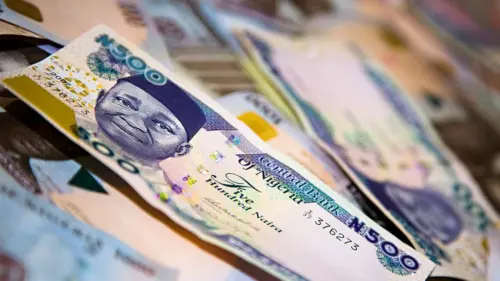
The Lagos Chamber of Commerce and Industry (LCCI) has urged Nigerians to take a hard look at the factors contributing to the continuous depreciation of the naira, arguing that the government is not to blame. According to LCCI President Gabriel Idahosa, the real culprit behind the Naira’s decline is the widespread national habit of excessive importation, which has resulted in the dollar consistently overshadowing the local currency.
Idahosa made these remarks while attending the launch of Zandaux, a new Business-to-Business (B2B) e-commerce platform in Lagos. He stressed that the overwhelming reliance on imported goods—from basic items like toothpicks and shoes to more advanced products—has created a situation where the naira is undervalued, as demand for foreign currency remains high to fund these imports.
Nigerians’ Import Obsession Drives Naira Depreciation
“If we are truly being honest with ourselves as business professionals, the government should not be held responsible for the ongoing fall of the naira,” Idahosa stated. “It is not the government that can directly prevent the naira from losing value. The real issue lies with the behavior of Nigerians, who import almost everything, prioritizing foreign goods and currencies over what we produce locally.”
He emphasized that a shift in national behavior—where Nigerians begin to focus more on consuming local products and services—could help reverse the currency’s downward trend. Idahosa believes that if Nigerians reduce their dependence on imports, whether for luxury goods or everyday necessities, the value of the naira would improve significantly. “Imagine if we started spending more on local products, traveled within Nigeria instead of going abroad for holidays, or chose Nigerian-made products over foreign alternatives. The naira would surely strengthen,” he added.
Practical Solutions to Strengthen the Naira
Idahosa’s comments reflect a broader sentiment that Nigeria’s economic woes, particularly its forex challenges, stem largely from structural consumption habits rather than policy failures alone. He also dismissed the idea that the Central Bank of Nigeria (CBN) could simply print more dollars to stabilize the naira, labeling such thinking as unrealistic. “Expecting the Central Bank to suddenly generate large amounts of dollars to lower exchange rates is impractical. Business owners seeking dollars to import goods must demonstrate a reciprocal commitment by exporting Nigerian goods to other countries,” he explained.
This approach, he suggested, would help balance the supply and demand of foreign currency, reduce Nigeria’s dependency on imported goods, and eventually support the naira’s recovery.

CBN’s Efforts to Address the Forex Crisis
The naira has been on a steady decline over the past six months, which has prompted the Central Bank of Nigeria (CBN) to adopt new policies to stabilize the currency. One such measure is the removal of the cap on foreign exchange rates, allowing commercial banks to determine their own rates based on market conditions. This policy shift is intended to ensure more efficient forex transactions and help alleviate some of the pressure on businesses and individuals who require foreign currency.
While some experts argue that the scarcity of the dollar and its hoarding by individuals and organizations contribute significantly to the naira’s weakness, others point to the practice of paying out remittances in dollars rather than naira, further exacerbating the situation.
Naira’s Continued Struggles Amid Currency and Policy Issues
Many Nigerians believe that the hoarding of dollars, coupled with an increasing demand for foreign currency, has intensified the naira’s depreciation. There are also concerns that banks’ practice of disbursing foreign exchange remittances in dollars, instead of in the local currency, undermines the value of the naira, causing further damage to the economy.
Idahosa’s position, however, highlights the importance of a collective national effort to reduce reliance on imports and instead focus on boosting local production and export activities. Such a shift in mindset, according to the LCCI, is crucial for addressing the forex challenges and revitalizing the Nigerian economy.


